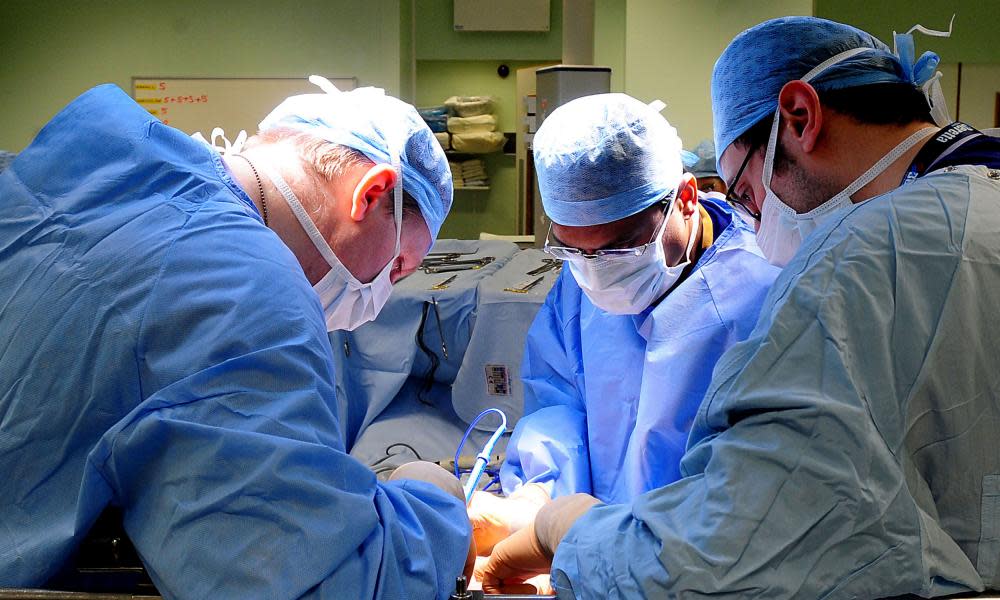It'll take four years for NHS to recover from Covid-19, health chiefs warn

The NHS will not be able to get back to providing its full range of services for as long as four years because of the huge disruption caused by Covid-19, hospital bosses warned on Saturday.
Patients will face much longer waits than usual for operations and diagnostic tests because hospitals’ drive to remain infection-free means they are closing beds, and surgeons’ need to wear protective clothing means they are carrying out fewer procedures than before the pandemic.
In a stark admission of the complexity of reopening the NHS, a key health service leader has predicted that some hospitals will be able to provide only 40% of the care they previously delivered.
Hospitals are under pressure from ministers and health charities to restart services as soon as possible for patients with conditions such as cancer, obesity and joint problems. But the chief executives of three NHS trusts in England have told the Observer that the “sheer complexity” of getting back to normal amid the lingering effects of Covid-19 means progress will be very slow.
“It could be four years before waiting times get back to pre-Covid levels. We could see that. It’s certainly years, not months,” said Glen Burley, the group chief executive of Warwick hospital, George Eliot hospital in Nuneaton and County hospital in Hereford.
There is growing evidence that many patients’ health has suffered in recent months, during which hospitals curtailed or suspended many normal services in order to focus on tackling Covid-19. People with cancer are at risk because their tumours have spread when surgery was postponed and gone undetected because they could not access diagnostic scans.
Experts believe the interruption to treatment could mean that the number of patients on the waiting list for a planned operation could soar from 4.2 million to as many as 10 million by the end of the year.
Sir Jim Mackey, chief executive of Northumbria Healthcare trust, which runs seven hospitals in the north-east, said: “Nationally, because there’s a big backlog already, that could take several years to get on top of. It’s not going to disappear overnight. Restoring normal services may be the biggest challenge the NHS has ever faced.”
Mackey, who ran the financial regulator NHS Improvement from 2015 to 2017, added: “It’s certainly one of the most complicated things I have ever dealt with in my 30 years in the NHS.”
Even with austerity everyone has become used to treatment without long waits … those days are at an end
Niall Dickson, NHS Confederation
Hospitals will not be able to provide treatment within 18 weeks – the supposed maximum delay anyone should face – for the foreseeable future, according to Niall Dickson, chief executive of the NHS Confederation, which represents health service trusts.
“I am not sure that either the public or the politicians really understand the mammoth challenge the NHS faces. Even with austerity everyone has become used to treatment without long waits and most services being accessible in spite of growing demand,” said Dickson. “Almost no matter what the government or the service does, those days are at an end.”
NHS organisations are building back services “with one hand tied behind their back”, said Dickson. “With social distancing and the need for personal protective equipment it is simply not possible in many services to deliver as much care as would have been possible in the past. Some services will not manage much more than 40% productivity.”
Related: NHS deal with private hospitals must be renewed, say surgeons
However, hospitals are doing everything they can to restore services, bosses stressed. They plan to increase their supply of beds and treat as many patients as possible before next winter brings extra pressure and a potential second wave of Covid-19 forces care to be suspended again.
Burley hopes to boost the capacity of George Eliot hospital by bringing in a mobile temporary operating theatre in which surgeons working at least six days a week would tackle the backlog of patients awaiting a hip or knee replacement, complementing the six theatres it already has. He also hopes to use modular buildings to provide 50 to 60 extra beds there and 40 to 50 beds at both Warwick and Hereford hospitals. Hospitals’ need to practise rigorous infection control means they can only have three or four beds open in what used to be a six-bedded bay. As a result, quick-build facilities, although generally used on a temporary basis, are likely to become permanent new additions at many trusts, Burley added.
Some trusts are using one hospital as their “hot” site to treat all urgent and emergency cases, including Covid-19 patients, and another as a “cold” site for planned procedures.
The Royal Wolverhampton trust, for example, is using the 10 operating theatres at its hospital in Cannock to carry out planned surgery and endoscopies, which help detect cancerous tumours. It is also taking advantage of the NHS’s £400m-a-month deal with the independent sector to send those awaiting breast cancer surgery to a private hospital run by Nuffield Health. “The safety of our patients and our staff is paramount, now more than ever, so without a vaccine we are currently only able to operate at 60% to 80% capacity, depending upon the service,” said David Loughton, the trust’s chief executive.
“This is due to strict infection prevention controls including donning and doffing of PPE, swabbing, testing and isolating patients and allowing additional time between operations or treatments to deep clean or allow air changes in operating theatres.”
Mackey warned that while diagnostic tests and many forms of elective care will increase in coming weeks “heavy operations” – including cancer, back operations, some joint procedures and bariatric surgery – will be a longer haul, because hospitals need to have a critical-care bed available for the patient in case complications arise, and those are in short supply as a legacy of the pandemic.

 Yahoo News
Yahoo News 
